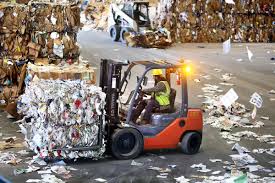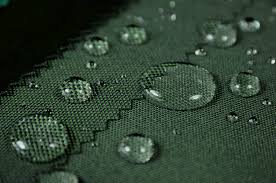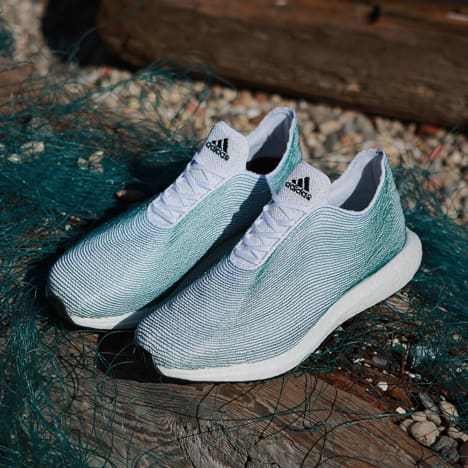Abstract
This article is all about how Adidas is putting an effort to save our earth from the threat due to the waste created from humans. I will discuss how they are doing this by incorporating new textile innovations. Adidas’ partnership with Parley for the Oceans, for recycling and removing the waste from the ocean. It has been an elemental part of the brand’s sustainability strategy.
Keywords: Recycling textiles, Sustainability, Waste management
1.0 Introduction
In 2015, these two companies teamed up to make sneakers which are entirely from the yarns recycled from ocean waste. Each pair of shoes is equivalent to 11 plastic bottles which mean Adidas had recycled 55 million plastic bottles that year. Made entirely out of waste, to create this shoe that puts plastic waste and illegally discarded gillnets found in the oceans to very good use.
2.0 Parley for the Oceans
Parley for the Oceans is a non-profit organisation. It is a network of creators, thinkers and leaders where they raise awareness for the cleanliness of the oceans and collaborate on projects that can end their destruction. It is a network of creators, thinkers and leaders where they raise awareness for the cleanliness of the oceans and collaborate on projects that can end their destruction.
In 2015 Adidas supported Parley for the Oceans’ initiative and committed to the Parley A.I.R.
Avoid – No use of single-use plastic and microbeads.
Intercept – Prevent plastic from entering the ocean and recover existing threats. Turning the problem into progress with an eco-innovative replacement for virgin plastic.
Redesign – Drive eco-innovation around materials, products and new ways of using them with the ultimate goal of reinventing current plastic.

FIG 3
3.0 How do they make it?
Parley and its partners collect trash from the coastal areas around the world like the Maldives. The waste is then balled and sent to Adidas X Parley supplier in Taiwan where they separate PET bottles from other waste. The Parley x Adidas shoes are made out of PET used most commonly for water bottles, and nylon from gill nets retrieved off the coast of Africa.


FIG 4 FIG 5
They separate PET plastic bottles from the waste and other plastic waste like plastic rings and caps of the PET bottles as it cannot be converted into yarn and are sent off to regular recycling and the PET plastic bottles are converted into yarns. In the processing plant to Adidas, the first step is crushing, washing and dehydrating the waste. After dehydrating it is converted into small plastic flakes. The flakes are then heated, dried and lastly, it is cooled and then cut it into small pellets. After this, the pellets are melted to create filament which is then spun into a form of polyester yarn which is called Ocean Plastic. After this, it is converted into desired products. This is then used to form the upper portion of the shoes. These shoes are made out of almost 75% of plastic.

FIG 6
3.1 What is PET?
It is a type of plastic that’s available in many variations depending on specific applications like for industrial use, for the storage of liquid and other food items. They carry with it a polyester film with a scratch-resistant matte coating on one facet and a silicone polymer adhesive on the opposite.
3.2 Characteristic of PET –

They separate PET plastic bottles from the waste and other plastic waste like plastic rings and caps of the PET bottles as it cannot be converted into yarn and are sent off to regular recycling and the PET plastic bottles are converted into yarns. The new material of Ocean plastic contains Polyethylene terephthalate (PET). which makes it a hard, stiff, strong, dimensionally stable, elastic material that absorbs very little water. It has smart gas barrier properties and smart chemical resistance except to alkalis. It is very strong and lightweight & hence easy and efficient to use.
3.3 Current usage-
This material was introduced in the form of shoes in the market.
But later on, Adidas incorporated this material into active sportswear.
This material turned out into high-performance polyester yarn used in apparel and footwear.


FIG 8 FIG 9
3.3 Future usage –
As discussed above this material has very good stiffness and it also has good strength, this material can be used in the automation textile and geotextile. The kind of stiffness and strongness geotextiles and automation textile required can be achieved by this material.
It also has good elasticity and it is light in weight which makes it easier to use. Hence it can also be used in medical textile.


FIG 10 FIG 11
4.0 BUT DOES IT SOLVE THE PROBLEM OF DEPLETING ENVIRONMENT COMPLETELY?
NO
That is why Adidas came up with a new technology which talks about the circular economy. It introduces Futurecraft.Loop.
FIG 12 https://youtu.be/1ptldIhAgpc
4.1 What is FUTURECRAFT.LOOP –
Adidas wants to make a material which is fully recyclable and should not harm our earth in any way. They want to end the concept of ‘waste’ entirely. Adidas is taking a linear method that leads merchandise to landfills at the tip of their lifecycle, and turning it into a circular system.

It can be recycled again and again after every product life cycle ends. This process is unstoppable as it forms a complete loop of the circular economy. All elements begin from equivalent raw pellets of TPU, that are then processed into foams, yarns and films up when they have been worn, remelted and turn over pellets once more, you’ve got a pure TPU granulate, that you may then introduce into footwear producing.
4.2 What is TPU?
TPU stands for thermoplastic polyurethane. TPUs are one type of plastic polyurethane and is considered to have elastic scratch resistance properties, as well as being transparent, and largely resistant to oil and grease. It also has a self-healing and breathability factor in it.

4.3 What is the need for this material?
Yarns of recycled PET mixed with natural fibres, rubber soles, combinations of bio-based and non-bio-based foams. All these could result in granulates that are almost impossible to reuse. These shoes can best be incinerated to create energy or they will likely still end up in the landfill. Because of all this, Adidas focuses on mono-material and introduces Future Craft. Loop material.
4.4 How does it work?
Adidas’ new shoes use one material type and no glue is used to make it. Each component is made from 100% reusable thermoplastic polyurethane. It’s spun to yarn, knitted, moulded and clean-fused to a boost midsole using Adidas speed factory technology.
The goal is to avoid plastic bags, microbeads, and eventually avoid more virgin plastic in the supply chain. The idea is to offer a high-performance running shoe that can be heavily worn, then returned, broken down and repurposed into a new version of the same pair of shoes.
This is the only shoe that you can put in a grinding machine and then you get the chance to be able to apply it back into another shoe.

FIG 15
4.5 Characteristics-
This material has a very high strength, durability and flexibility features. Its resistance against abrasion, water, and the chemical is also very good.


FIG 16 FIG 17
Future Scope and Conclusion-
Presently, the company is using this material to manufacture shoes. According to the properties of material I have to conclude that this material can be used for upholstery fabric and other home linen fabric. As for upholstery, we need a strong and durable fabric that will be perfect for this use. This will also help eradicate waste. As it has good resistance to water, this fabric can also be used as flexible storage tanks for products like water, food (such as milk, wine and oils), pharmaceutical products, and all types of fossil fuels. Flexible storage is generally made up of polyester. This material can be a great innovation in the packaging industry. This material can replace the plastic bottles and tetra packaging which is used a lot in the packaging industry.


FIG 18 FIG 19

FIG 20



